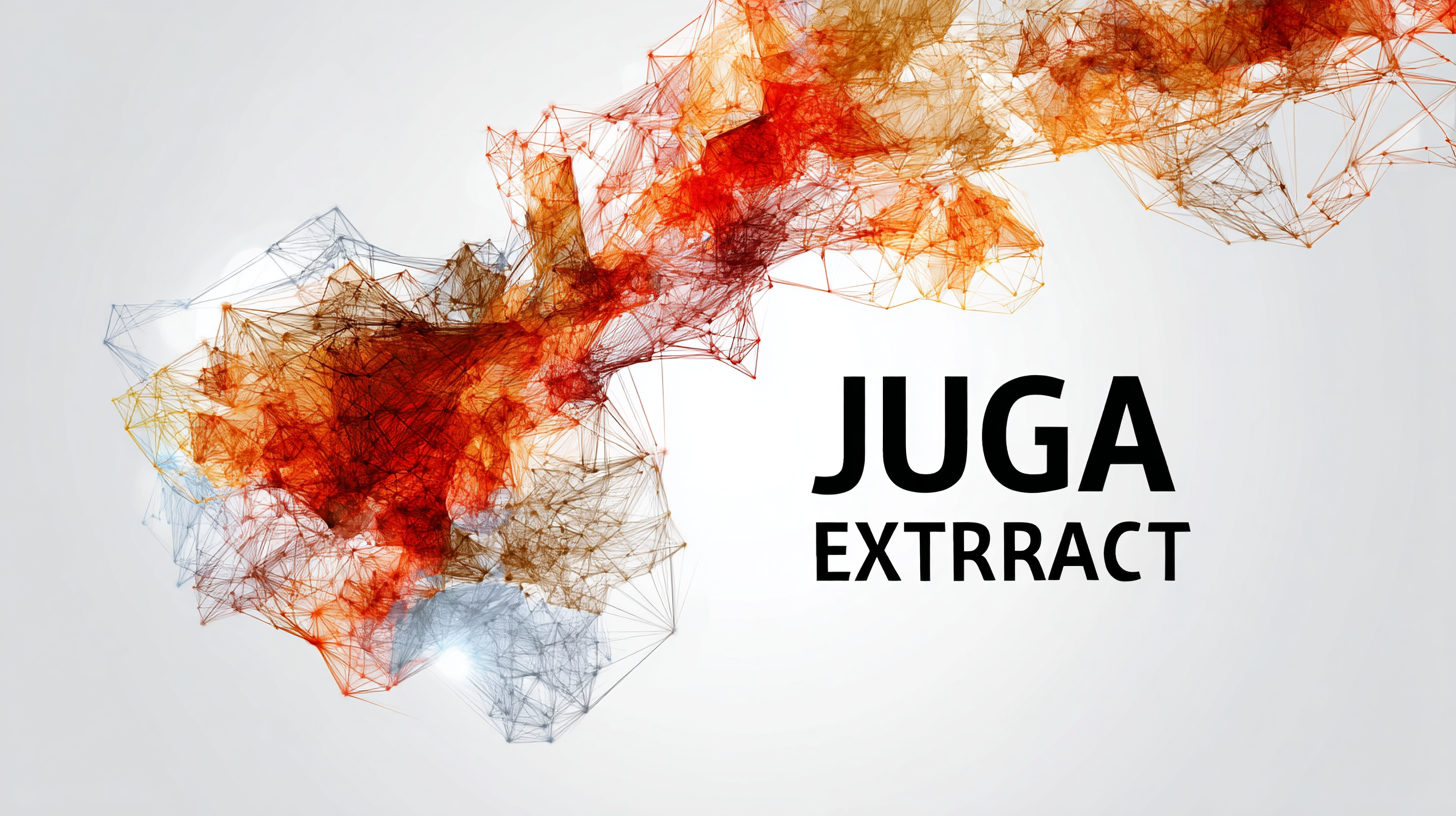Mastering Juga Extract: A Comprehensive Tutorial for Global Buyers
In recent years, the global market for herbal extracts, particularly Juga Extract, has witnessed significant growth, driven by increasing consumer awareness of natural products and their therapeutic benefits. According to a report by Grand View Research, the herbal extracts market is projected to reach USD 6.87 billion by 2025, growing at a CAGR of 7.5%. Various forms of Juga Extract, derived from different plant sources, offer unique properties and applications that cater to diverse consumer needs, from dietary supplements to cosmetic formulations.
This comprehensive tutorial aims to provide global buyers with an in-depth understanding of the distinct characteristics and applicable ranges of various types of Juga Extract, empowering them to make informed purchasing decisions in an ever-evolving marketplace.
Understanding Juga Extract: What Makes It a Top Choice for Buyers
When it comes to selecting a premium extract, Juga Extract stands out as a top choice for global buyers. Renowned for its superior flavor profile and versatility, Juga Extract is becoming increasingly popular in culinary applications. One of the key factors that elevate its status is the meticulous sourcing and extraction process it undergoes. Much like the rigorous testing conducted for baking extracts, Juga Extract proves its worth through stringent quality checks, ensuring a product that delivers both in taste and consistency.
Furthermore, similar to the increasing demand for potent and effective herbal supplements, Juga Extract is gaining traction among health-conscious consumers. Its natural properties offer numerous benefits that tantalize both chefs and health enthusiasts alike. As buyers seek out the best options available, the ability of Juga Extract to seamlessly integrate into various applications—from gourmet cooking to health supplements—makes it an attractive choice. This alignment with growing trends in the market highlights Juga Extract's potential to become a staple in kitchens and wellness regimes worldwide.
Mastering Juga Extract: A Comprehensive Tutorial for Global Buyers
| Dimension |
Details |
| Origin |
Southeast Asia |
| Common Uses |
Food, Beverage, Nutraceuticals |
| Health Benefits |
Antioxidant properties, Supports metabolism |
| Market Demand |
Growing among health-conscious consumers |
| Forms Available |
Powder, Extract, Whole Leaf |
| Regulatory Status |
Generally Recognized As Safe (GRAS) |
| Sourcing Considerations |
Sustainable and ethical sourcing practices recommended |
| Supplier Transparency |
High-quality suppliers provide detailed product specifications |
The Global Reach of Chinese Manufacturing: Juga Extract's Impact
The globalization of Chinese manufacturing has reached new heights with the impact of products like Juga Extract. As the demand for natural and effective solutions rises, this unique extract has captured the attention of buyers across the globe. Its origins in traditional Chinese techniques highlight the country’s rich heritage in harnessing the power of nature for health and wellness, providing a bridge between ancient practices and modern consumer needs.
The recent popularity of various Chinese products, exemplified by the success of a blockbuster video game, reflects a burgeoning interest in Chinese culture and innovation. This cultural resonance not only stimulates economic interest but also positions Chinese manufacturing as a vital player on the global stage. With products like Juga Extract leading the way, global buyers can expect a diverse array of offerings that blend traditional wisdom with contemporary standards, making it an exciting time for international trade and collaboration in the realm of wellness and beyond.
Quality Control in Juga Extract Production: Ensuring Consistency and Purity
 Quality control in the production of Juga extract is essential to ensure both consistency and purity, especially in a global market increasingly focused on sustainability and effectiveness. The integration of advanced quality control measures can drive the production of Juga extract toward a sustainable model akin to innovations in bioplastics, such as polyhydroxyalkanoates (PHAs). A recent report highlighted the challenges within the bioplastics sector, including the need for cost-effective and environmentally friendly production methods. By adopting similar strategies, the Juga extract industry can mitigate risks associated with contamination and variances in potency, thereby improving consumer trust and marketability.
Quality control in the production of Juga extract is essential to ensure both consistency and purity, especially in a global market increasingly focused on sustainability and effectiveness. The integration of advanced quality control measures can drive the production of Juga extract toward a sustainable model akin to innovations in bioplastics, such as polyhydroxyalkanoates (PHAs). A recent report highlighted the challenges within the bioplastics sector, including the need for cost-effective and environmentally friendly production methods. By adopting similar strategies, the Juga extract industry can mitigate risks associated with contamination and variances in potency, thereby improving consumer trust and marketability.
Emerging technologies are reshaping quality control standards across various sectors, including the production of advanced therapy medicinal products (ATMPs). The focus on meticulous tracking of bioactivity and compliance with Good Manufacturing Practices (GMP) parallels the need for rigorous quality checks in Juga extract manufacturing. This proactive approach not only aligns with current regulatory demands but also emphasizes the importance of product integrity. Reports suggest that implementing robust quality monitoring systems can lead to significant reductions in waste and discrepancies during production, ultimately ensuring that consumers receive a consistent, high-quality product well-suited for therapeutic applications.
Sustainability Practices in Juga Extract Sourcing: A Buyer’s Guide
In the realm of global trade, understanding sustainability practices in the sourcing of Juga extract is paramount for conscious buyers. As the demand for natural and ethically sourced ingredients increases, buyers must prioritize suppliers who adhere to environmentally friendly practices. This goes beyond simply choosing organic products; it involves assessing the entire supply chain, from harvest methods to the impact on local ecosystems. Engaging with suppliers who implement agroforestry techniques or support local communities not only fosters environmental health but also aligns with a growing consumer preference for sustainable products.
Moreover, transparent sourcing practices are crucial for buyers looking to make informed decisions. Verifying certifications and engaging in direct dialogues with suppliers can lead to a clearer understanding of their sustainability commitments. Buyers should seek out detailed information on how Juga extract is harvested, processed, and transported. By prioritizing companies with robust environmental policies and community engagement initiatives, buyers can ensure they are contributing to a more sustainable industry, ultimately benefiting both the planet and their own market position.
Sustainability Practices in Juga Extract Sourcing
Navigating Import Regulations for Juga Extract: Tips for Global Buyers
When it comes to importing Juga Extract, understanding the regulations can be a daunting task for global buyers. Each country has its own set of rules governing the import of food supplements and botanical extracts, and failing to comply can lead to costly delays or fines. It is essential to conduct thorough research on the regulatory landscape of the target market before proceeding with any importation.
One vital tip for navigating these regulations is to familiarize yourself with the documentation required for import. This may include licenses, phytosanitary certificates, and quality assurance tests. Ensuring that all documents are in order and compliant with local laws can save you from potential roadblocks at customs. Additionally, staying updated on any changes in import policies will help you adapt your strategy and maintain smooth operations.
Another helpful suggestion is to build strong relationships with local import agents or logistics companies. These professionals have a deep understanding of the intricate regulatory framework and can provide invaluable insights that will simplify the import process. Leveraging their expertise can help you navigate the complexities of compliance, ensuring that your Juga Extract reaches its destination without a hitch.


About Us
Products
Nutraceuticals
Botanical Extracts
Berberis Extract
Ginkgo Biloba Extract
Rutin
Quercetin
Grape Seed Extract
European Bilberry Extract
Broccoli Seed Extract
Fisetin
Ajuga Extract
Resveratrol
Stevia Leaf Extract
Green Tea Extract
Olive Leaf Extract
Epimedium Extract
Rhodiola Rosea Extract
Panax Ginseng Extract
Pomegranate Extract
Garlic Extract
Milk Thistle Extract
Black Pepper Extract
Fruit & Vegetable Juice Powder
Customized Service
News
Blog
Contact Us


